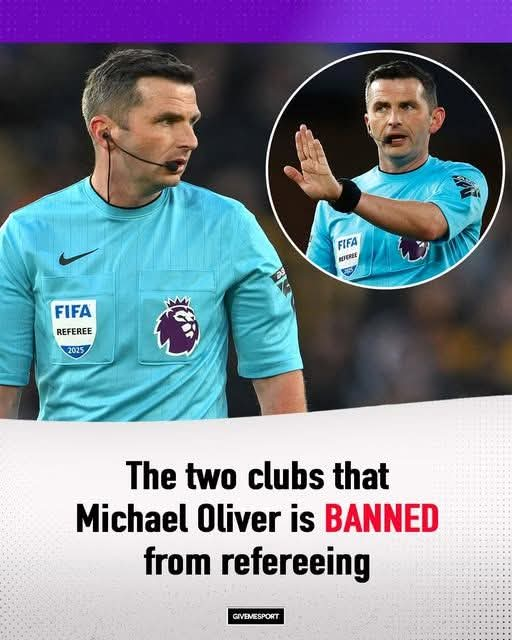
The Two Clubs Michael Oliver is Banned From Refereein
Michael Oliver, a prominent referee in the Premier League, has found himself at the center of several controversies throughout his career. The most recent one involved a decision during Liverpool’s 3-0 loss to Manchester City at the Etihad, which sparked widespread debate and outrage among fans. The incident occurred when Oliver, after consulting with his assistant referee, ruled out Virgil van Dijk’s goal for offside, citing that Andy Robertson had made an ‘obvious action directly in front of the goalkeeper,’ Gianluigi Donnarumma. This decision ignited a storm of criticism online, as many fans believed that Robertson hadn’t interfered with Donnarumma’s line of sight and had merely ducked to let the ball go in.
The outrage surrounding this incident has been compounded by a long-standing narrative among football fans that Oliver holds a personal bias against Liverpool. Many point to a similar controversial moment in a 2024 fixture between Liverpool and Manchester City, when Jeremy Doku was not penalized for a kick on Alexis Mac Allister in the penalty area. Oliver’s history of not sending off Manchester City players, despite a number of red-card-worthy offenses, only fueled the belief that there is an underlying bias in his officiating.
While these allegations of bias have persisted for some time, a lesser-known fact about Michael Oliver is that he is banned from officiating games involving certain English clubs. Specifically, he is not allowed to referee matches involving Newcastle United or Sunderland, and this has nothing to do with any past mistakes or controversies on the field. Instead, it stems from his roots in Ashington, Northumberland. Oliver has admitted that his personal connections to these areas, including his support for Newcastle, have led to restrictions on the matches he can officiate. In an interview, he explained, “We have to declare if we have an allegiance to any club or if a family member works at a club. You can’t do any match involving that team, and I can’t do Sunderland, either, for obvious reasons.”
This ban on officiating Newcastle and Sunderland games is a result of the Professional Game Match Officials Limited (PGMOL) ensuring impartiality among referees. According to Keith Hackett, former chief of PGMOL, referees must disclose any personal affiliations to clubs when they undergo an annual audit. This includes information about their support for teams, family connections, and even their geographical location. Hackett further clarified that referees from specific areas, like Sheffield, would not be appointed to officiate matches involving Sheffield clubs due to the potential for bias.
Michael Oliver’s ban from these two clubs is a preventive measure aimed at avoiding any perceived conflicts of interest. However, this regulation doesn’t absolve him of scrutiny when it comes to his decisions in other matches, particularly high-profile ones like Liverpool’s clash with Manchester City. The Van Dijk disallowed goal continues to be a point of contention among Liverpool fans, who feel that Oliver’s ruling was unjustified. Despite these complaints, the PGMOL has stood by their officials, citing that such decisions are often subjective and open to interpretation.
Liverpool’s response to the disallowed goal was swift, as they expressed their ‘serious concerns’ to PGMOL following the match. The club voiced their dissatisfaction with the officiating and requested a review of the incident. While Oliver’s decision was not overturned, the controversy has added to the growing perception that the Premier League’s officiating standards need to be reevaluated. Fans and pundits alike have called for greater consistency and transparency in the way refereeing decisions are made.
Despite the backlash, Michael Oliver has continued to officiate Premier League matches, maintaining a position of authority in English football. His career, which began at the tender age of 14, has seen him rise through the ranks to become one of the most recognized referees in the country. In 2010, at just 25 years old, he made history as the youngest-ever Premier League referee. Since then, he has officiated numerous high-profile matches, becoming a fixture in the top tier of English football. However, his rise to prominence has not been without its share of controversy.
Over the years, Oliver has garnered a reputation for being a strict and decisive referee, though not without criticism. Some fans argue that his decisions tend to favor certain teams, while others claim that he is overly harsh on others. The consistency of his officiating has been questioned in various instances, and the debate over his perceived bias against Liverpool is just one example of the ongoing scrutiny he faces.
While some may believe that Oliver’s career is marred by controversial decisions, it is important to acknowledge the challenges that come with officiating at the highest level of football. Referees are often under immense pressure to make split-second decisions in high-stakes situations, and not all calls are universally accepted. However, the fact remains that Michael Oliver’s decisions, both past and present, have placed him under intense scrutiny, particularly in matches involving high-profile clubs like Liverpool and Manchester City.
In conclusion, Michael Oliver’s career has been shaped by both his achievements and controversies. His ban from officiating Newcastle and Sunderland matches, while necessary for maintaining impartiality, serves as a reminder of the complexities that come with being a top-flight referee. The ongoing debate surrounding his decision to disallow Van Dijk’s goal in the Liverpool-Manchester City match is just another chapter in a career filled with ups and downs. While some may question his integrity, it is clear that Oliver’s legacy as a Premier League referee will be defined by both the praise and the criticism he has received throughout his tenure.